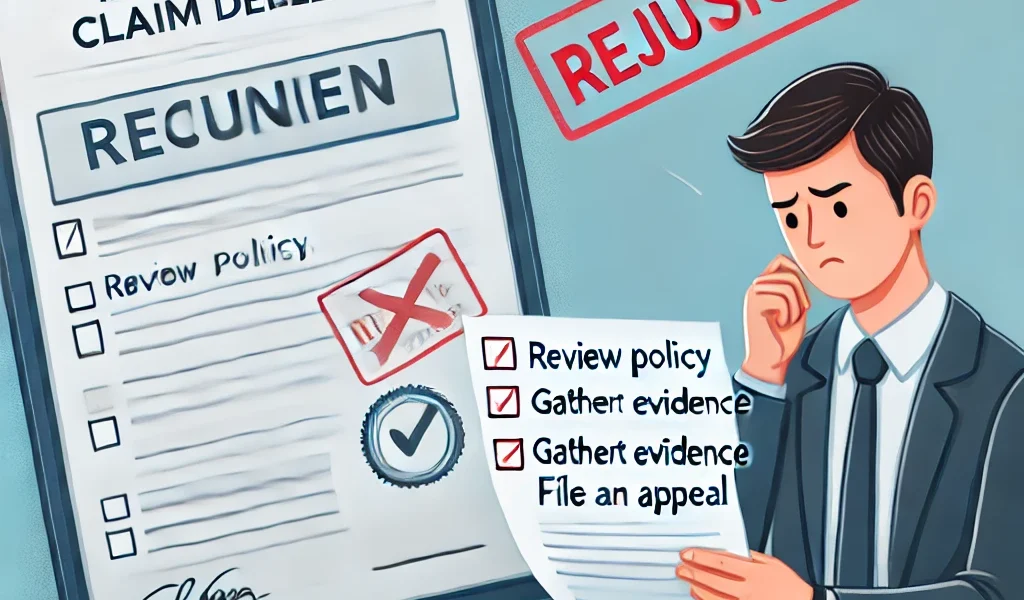Dealing with a denied insurance claim can be frustrating and stressful, especially when you rely on that coverage to handle unexpected expenses. However, a denied claim does not mean the end of the road. Understanding why claims get denied and knowing the right steps to take can help you challenge the decision and increase your chances of getting the payout you deserve. This DIY guide will walk you through the process of handling a denied insurance claim efficiently and legally.
1. Understand Why Your Claim Was Denied
Why It’s Important:
Insurance companies provide specific reasons for denying claims. Identifying the reason will help you determine the best course of action.
Common Reasons for Claim Denials:
- Policy Exclusions: Your claim might involve a situation not covered under your policy.
- Incomplete or Incorrect Documentation: Missing paperwork or errors in the claim form.
- Lapsed Policy: Non-payment of premiums leading to policy cancellation.
- Delays in Filing the Claim: Late submissions beyond the insurer’s deadline.
- Insufficient Proof of Loss: Lack of evidence supporting your claim.
- Suspicion of Fraud: If the insurer suspects any misrepresentation or exaggeration.
How to Avoid Future Denials:
- Review your policy carefully to understand coverage details.
- Always submit complete and accurate documentation.
- Pay premiums on time to keep the policy active.
- File claims promptly after the incident.
2. Review the Denial Letter Thoroughly
Why It’s Important:
Insurance companies send a formal denial letter explaining why your claim was rejected. This letter will be your key reference when disputing the decision.
Steps to Take:
- Carefully read the denial letter to understand the insurer’s reasoning.
- Check for any errors or misinterpretations in the decision.
- Compare the stated reason with your policy terms and conditions.
- Look for any specific instructions on how to appeal the denial.
3. Gather Additional Evidence
Why It’s Important:
Providing more supporting documents can strengthen your case if the claim was denied due to insufficient proof.
Steps to Take:
- Collect photographs, videos, receipts, and invoices related to the claim.
- Request a police report (for theft, accidents, or criminal incidents).
- Obtain medical reports and bills for health insurance claims.
- Seek an independent damage assessment (for property or auto claims).
4. Contact Your Insurance Provider
Why It’s Important:
Sometimes, a simple discussion with your insurer can resolve the issue without a formal appeal.
Steps to Take:
- Call the claims department and ask for a clear explanation of the denial.
- Verify if additional documents can be submitted to reconsider the decision.
- Keep a record of all communications (emails, calls, and letters) for reference.
5. File a Formal Appeal
Why It’s Important:
If the denial seems unjustified, you have the right to appeal and request a review of your case.
Steps to Take:
- Follow the appeal instructions provided in the denial letter.
- Write a formal appeal letter stating why you believe the claim was wrongly denied.
- Attach all supporting documents that strengthen your case.
- Submit the appeal within the insurer’s specified deadline.
6. Seek Assistance from a Professional
Why It’s Important:
If the insurance company remains uncooperative, a professional can advocate for you.
Who Can Help?
- Public Adjusters: Experts in negotiating insurance claims for policyholders.
- Legal Advisors: If the denial is complex, a lawyer specializing in insurance law can help.
- State Insurance Regulators: Many states have agencies that oversee insurance disputes and can mediate on your behalf.
7. Escalate to a Regulatory Authority
Why It’s Important:
If your insurer is acting unfairly, you can report the case to a regulatory body for review.
Steps to Take:
- Research your country or state’s insurance regulatory authority.
- File a formal complaint detailing the denial and why you believe it is unfair.
- Provide copies of all correspondence, documents, and appeal letters.
- Await an official investigation and response.
8. Consider Legal Action as a Last Resort
Why It’s Important:
If all other efforts fail, taking legal action might be necessary to receive the payout you deserve.
Steps to Take:
- Consult an insurance litigation attorney for legal advice.
- Evaluate if the claim amount justifies the legal costs involved.
- Consider alternative dispute resolution methods such as mediation or arbitration before proceeding with a lawsuit.
9. Learn from the Experience
Why It’s Important:
Being proactive can help prevent future claim denials and ensure a smoother process.
Key Takeaways:
- Always review and understand your policy before filing a claim.
- Keep detailed records of incidents, losses, and all related documents.
- File claims promptly and follow up regularly for updates.
- If denied, act quickly and appeal with strong supporting evidence.
Conclusion
A denied insurance claim doesn’t mean you have to accept the loss. By understanding the reasons for denial, gathering proper documentation, and following a structured appeal process, you can increase your chances of getting your claim approved. Always stay informed, persistent, and organized in handling insurance matters.
If necessary, seek professional help to ensure your rights are protected. Taking proactive steps can not only help resolve current claim denials but also prevent future complications in the claims process.




